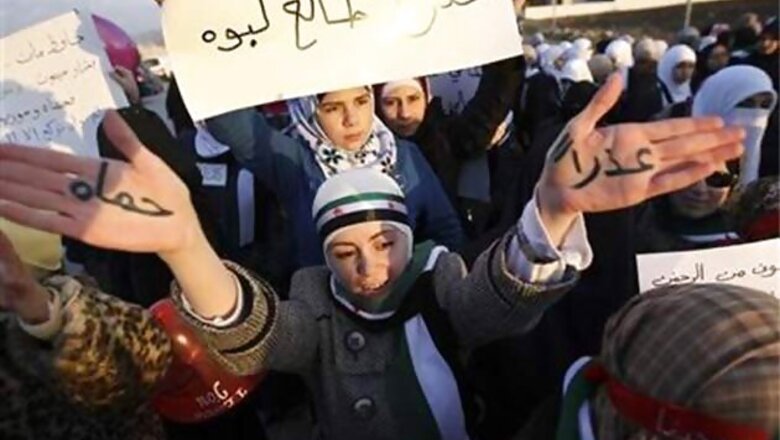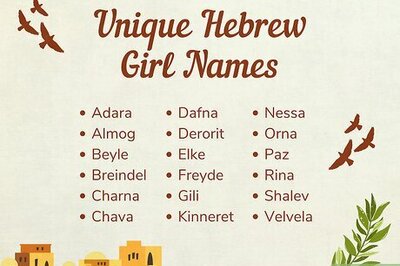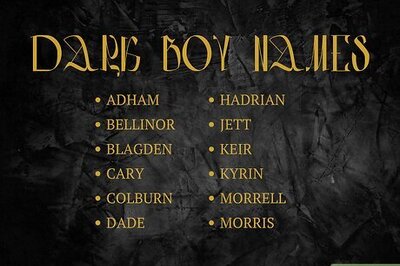
views
Beirut: Syrian troops closed public squares in Hama on Thursday after residents poured red paint symbolising blood on the ground to mark the 30th anniversary of the massacre President Bashar al-Assad's father carried out to crush an uprising.
Assad has been locked in struggle with a revolt against his own rule for the past 11 months, with at least 5,000 deaths by a United Nations count, stirring Arab and Western calls for international action to stop the bloodshed.
That has been held up by Russian opposition to any steps that would remove Assad or pave the way to foreign intervention. But the current head of the UN Security Council said on Thursday a consensus on a Syria resolution could emerge soon.
"The feeling on the Council is that consensus will be achieved shortly," Ambassador Kodjo Menan of Togo said.
Council members were to meet at 3 p.m. (2000 GMT) in New York to weigh the latest version of a European-Arab draft resolution and they want "swift action", Menan told reporters.
The latest text includes changes made by Arab and European negotiators to meet some of Russia's concerns. It no longer spells out details of what the Arab plan entails, such as Assad giving up power, but still "fully supports" the plan.
Moscow has also demanded language explicitly ruling out the use of external force in Syria, though the current draft makes clear the council wants the crisis resolved peacefully and the resolution could not be used as the basis for military intervention as in Libya's uprising last year.
The draft does not threaten Syria with sanctions, also rejected by Russia, but does include a vague reference to possible "further measures" in the event of Syrian non-compliance.
Several Western diplomats said they were hoping for agreement that could be put to a vote on Friday or over the weekend. Other diplomats said there were no signs on Thursday that Russia was satisfied.
"Unacceptable"
Moscow, which has been a key strategic ally of Syria during its 49 years under Assad dynastic rule and a major arms supplier to Damascus, is demanding any U.N. resolution explicitly rule out foreign intervention or it would be "unacceptable".
What began as civilian street protests which Assad tried to crush with troops and tanks has evolved in some regions into an armed insurgency that has spread to the gates of Damascus.
Opposition activists say Assad's forces have stepped up operations around the country after appearing to crush rebels who brought the fight to the outskirts of the capital.
Activists in Hama said fire trucks washed away dye and paint poured on the ground overnight to commemorate the bloodshed of Hafez al-Assad's 1982 assault on the city - centre of an Islamist revolt against him - at the cost of over 10,000 lives.
"They want to kill the memory and they do not want us to remember," said an activist in the city, where residents said tanks blocked main squares to prevent demonstrations. "But we will not accept it." Residents said snipers took up positions in the city subsequently.
Hama marked the anniversary of the massacre as Russia fended off attempts to mobilise the United Nations against Syria.
Russia and China, both veto-wielding Security Council members, have stood in the way of the push for a resolution condemning the Syrian government's crackdown on unrest.
Security Council ambassadors failed in a meeting on Wednesday to overcome their disagreements on resolution wording.
"It's way too soon in my judgment to know whether ultimately there will be agreement," the U.S. ambassador to the United Nations, Susan Rice, told reporters. "It's long past time for this council to take meaningful action," she said.
Despite the Russian comments, French Foreign Minister Alain Juppe said a "window of hope" had opened, and vowed redoubled efforts to agree a text "in the next few days".
Russia says the West exploited fuzzy wording in a March 2011 U.N. Security Council resolution on Libya to turn a mandate to protect civilians in the North African country's uprising into a push to remove the government, backed by NATO air strikes, that led to the overthrow of Muammar Gaddafi.
The Syria resolution came to the global body after the Arab League suspended its monitoring mission in Syria On January 28 as violence surged. Jordan said on Thursday it was pulling its monitors from that mission, joining the departure of Gulf Arab observers, in response to the League's move.
"Whose side are you on?"
Western envoys at the Security Council said earlier that the main sticking point was likely to be not military intervention, on which they were confident agreement could be reached, but the resolution's support for the Arab League plan demanding Assad give up power - seen by Moscow as tantamount to regime change.
The envoys said their biggest challenge would be to reword the draft so that it still endorses the plan but in a way that is weaker than the current version.
U.S. Secretary of State Hillary Clinton told reporters: "Every member of the council has to make a decision: Whose side are you on? Are you on the side of the Syrian people? ... Or are you on the side of a brutal, dictatorial regime?"
Sporadic gunfire echoed through the Damascus suburb of Maadamiyyah on Thursday and the body of an army defector was returned to his family mutilated, one activist said. Another reported that Syrian forces killed another activist in that district after raiding his home on Wednesday.
The Syrian state news agency SANA reported funerals of 19 security force personnel killed confronting "terrorist groups", bringing the total of such deaths it has declared in the past few days to about 100. It said a general was killed on Wednesday.
Syrian insurgents said on Wednesday Assad's forces had extended a military sweep against eastern and northern suburbs of Damascus where they hit rebels hard this week. An activist group said at least 25 people had been killed in that sweep.
It was not possible to verify the reports as Syria restricts access for independent media.

















Comments
0 comment